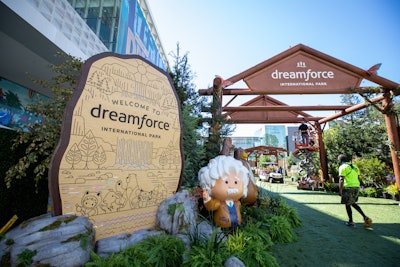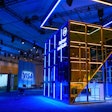
Want more content like this sent directly to your inbox? Then sign up for our brand-new BizBash Event Tech monthly newsletter to stay in the know on the latest event technology news and tools to elevate your meetings and events.
In 2021, Salesforce managed to safely gather more than 4,500 event attendees for two in-person conferences. And now, the San Francisco-based software company is sharing its secrets with its customers too.
On Feb. 1, Salesforce officially announced Safety Cloud, a new product that helps businesses, communities and event organizers better manage their testing, health and entry protocols to create safer in-person gatherings. Built into the Salesforce platform, Safely Cloud offers a streamlined way to build flexible, scalable protocols surrounding testing and vaccine status requirements, identity and registration, plus personalized communication journeys as public health guidelines change.
The platform combines ID and health status into a Dreampass—a secure, multifactor pass for validated access. Salesforce has already used the product to reopen 84 of its offices globally and to host its 2021 Dreamforce events in San Francisco and New York. Companies like Accenture and Traction on Demand are also working with Salesforce to bring their employees and event attendees together.  Safety Cloud's dashboard centralizes identification and registration data.Photo: Courtesy of Salesforce
Safety Cloud's dashboard centralizes identification and registration data.Photo: Courtesy of Salesforce
What’s more, Salesforce recently updated its Safety Playbook, a free-to-the-public resource co-authored by the company’s chief marketing officer, chief people officer and chief medical officer to help organizations manage COVID-19 testing protocols and validate entry to events and workplaces.
Here, BizBash chatted with Dr. Geeta Nayyar, Salesforce’s chief medical officer, about how the new offerings work, why Salesforce is investing in health and safety and the advice she’d give event organizers moving forward.
Why did Salesforce want to develop its own health- and safety-focused offerings?
Salesforce has its roots in health care. We've been in health care for over 20 years with our health and life sciences business, working with the likes of Humana and CVS. Obviously, none of us could have anticipated the pandemic—but that caused us to really pause, think hard and think about how we could contribute to the community around us.
At the beginning [of the pandemic], we launched Work.com, which was really centered around emergency response management, contact tracing and basically using the best of health and safety for that moment in time. We're very proud of that. Then when vaccines became available, we launched Vaccine Cloud, which was all about getting vaccine shots into arms equitably, mass distribution and the management around that.
Now, as we enter this phase of the pandemic, where we do have vaccines and we do have testing and masks, we understand more about the virus and the pandemic. We've launched both our Safety Playbook, as well as our Safety Cloud product.
Tell us more about the Safety Playbook and how that came about.
Particularly for event professionals, the first thing you need to think about is your strategy. What are you trying to accomplish? Our playbook was a joint project between myself, our chief people officer and our chief marketing officer. My section obviously was about the science: How do you use vaccines effectively? How do you think about boosters? How do you think about testing and masking, and can you be flexible and agile? Because at different moments, those things are all important in different ways. It's really meant to be a useful guide to our customers.
And the playbook is free for anyone to download, correct?
Yes. We appreciate that so many organizations are struggling. I think we're at a point in the pandemic where it's all about lessons learned—and we're also looking to learn from others. We don't pretend to have all of the answers, but we are really proud of the work we've been able to accomplish to date.
Our intention is to lead, and we believe leading with health and safety and science first is the way to go about this, no matter what comes. We couldn't have foreseen delta and then omicron, and then whatever the next six months have in store. But we are very much staying on top of the science, and we think it's important to share that.
 Dreampass—Salesforce’s secure, multifactor pass for validated access—will support integration with SMART Health Cards and EU Digital COVID Certificates.Photo: Courtesy of Salesforce
Dreampass—Salesforce’s secure, multifactor pass for validated access—will support integration with SMART Health Cards and EU Digital COVID Certificates.Photo: Courtesy of Salesforce
Yes, develop a strategy, then implementing the product comes second. Take, for example, when you go to New York City. They're asking you manually to show a vaccine card, and then someone is manually checking that, which is easy for fraud. What is really neat about Safety Cloud is that we're able to standardize it and automate it.
If you've read our playbook, hopefully you're asking yourself, “What is my protocol? Are vaccines important? Is testing important? Is masking important?” And again, at different times in the pandemic, those things have had a little more weight. Safety Cloud allows you to have agile protocols, for whatever you and your organization might decide is important for the moment. So there's the automation of protocols, and then there's the automation of the verification and the security piece, and also the entry. So, basically, if you've cleared whatever protocol you might have established, then Safety Cloud allows you to have what's called the Dreampass. Once you've been given the go-ahead, you get a QR code for event entry.
Safety Cloud is meant for scale. We are all trying to get back into an environment where we can gather, so this is meant for those big gatherings, and it’s meant to automate and be agile.
How has the Salesforce team been using Safety Cloud for its own events?
We used this for Dreamforce San Francisco and New York, where we did 21,500 COVID-19 tests and verified more than 8,000 vaccine credentials. The testing numbers are almost double because we did a pretest and [another] test once you arrive. This is how we were able to get 4,500 attendees together safely.
In your opinion, is testing twice something you’d recommend for events?
In my mind, everything in medicine is prevention—an ounce of prevention is worth a pound in cure. If you're able to find folks who have COVID-19 before they get to your event—before they get on a plane and fly all the way there—it is truly a better user experience for the individual. And, of course, it's much easier to prevent someone [with COVID-19] from getting into your event from a contact tracing standpoint, and to decrease anxiety from folks that are there. It’s all about prevention.
What else should event organizers be thinking about when it comes to health and safety?
The pandemic has unfortunately—or fortunately—been a great reminder to us that health and safety should have always been first. … One of the things I would highlight is my role, frankly. I’m the chief medical officer of Salesforce. It is a relatively new role, and an emerging role at many companies—but if you're an event organizer, you want to be best friends with your chief medical officer.
We lovingly here call it “CMO squared”—our chief marketing officer and myself work so closely together. She wants a great experience, she wants this many people together, she wants it inside or outside or whatever her objectives are from an event standpoint. And then I'm able to walk through with her saying, “OK, so let's think about the science. How would we do that? How would we do it in a way that is not impacting the experience, but is also still safe?”
It’s about having that partnership and recognizing that leading through the pandemic is a team sport. A medical advisor may be a new seat at the table, but embracing that and working together has been key to our success here at Salesforce. And I think many event organizers that embrace that kind of partnership will find themselves a lot more secure and confident as they're thinking about planning over the next three to six months. Having that grounding in science can make it that much stronger of an event.
This interview has been edited and condensed.



















